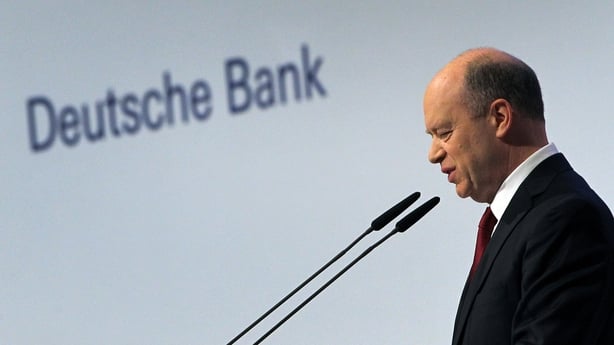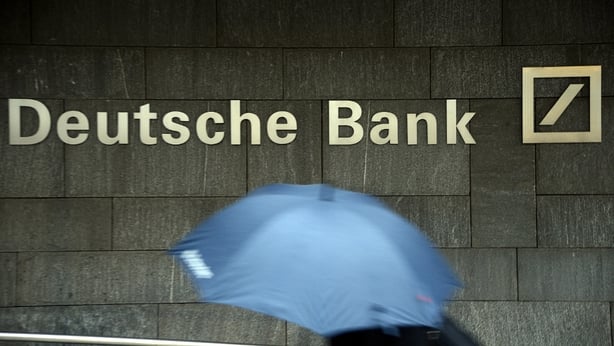Deutsche Bank is near an agreement with US officials to pay $5.4 billion (€4.8 billion) to settle charges over its sale of toxic mortgage bonds ahead of the financial crisis, according to AFP news agency.
The figure is far less than the $14 billion (€12.4 billion) asked by the US Justice Department, and sent the beaten-down shares of the German financial giant soaring.
Its stock leapt by 5.79% in the final minutes of trading in Frankfurt Friday, rebounding from a plunge to historic lows earlier in the day.
After plumbing the depths of a €9.90 stock price – more than 9% down on yesterday's close – traders pushed the shares to €11.51 just before 5.30pm in a flurry of buying activity.
US shares of Deutsche Bank rose 14.5% to $13.15.
An agreement could be announced in the next couple of days, a source told AFP.
The final amount of settlement could also be slightly different.
US officials had earlier pressed Deutsche Bank to pay $14 billion to settle the case, which concerns allegations the German bank knowingly sold toxic mortgage-backed securities between 2006 and 2008 that helped lead to the financial crisis.
But Deutsche Bank rejected the figure, which analysts called big enough to stress the German bank's capital position.
The tough US stance raised questions of whether Deutsche Bank would seek a bailout from the German government, an idea strongly rejected by German officials.
Deutsche Bank and the Department of Justice declined comment.
US stocks had plunged earlier on reports that a handful of hedge funds had withdrawn some money from Deutsche Bank due to concerns about its solvency.

Earlier, Deutsche Bank's Chief Executive sought to reassure his staff that Germany's largest lender remained robust after its shares again fell to record lows.
Chief executive John Cryan's letter, seen by Reuters, addressed reports of the departure of a few hedge fund clients, blaming unfounded speculation and "certain forces" that wanted to weaken trust in the bank.
People familiar with the matter told Reuters that one large hedge fund in Asia had pulled out collateral from Deutsche amounting to $50m in the last two days, while other sources said this had happened elsewhere, albeit on a small scale.
John Cryan sought to put the moves into perspective today.
"We should look at the complete picture," Cryan said in the letter to the bank's workers, adding that Deutsche had more than 20 million customers and reserves of more than €215 billion.
"We are and remain a strong Deutsche Bank," he stated.
Deutsche is much smaller than Wall Street rivals such as JPMorgan and Citigroup.
But it has significant trading relationships with all of the world's largest finance houses and the International Monetary Fund this year identified it as a bigger potential risk to the wider financial system than any other global bank.
Worries over a major bank in Europe's largest economy and talk of a government rescue have stirred painful memories of the 2007-2009 financial crisis.
Italy, whose banks have their own troubles caused by soured loans, called for swift action on Deutsche.
"Just like the problem of bad bank loans must be solved within a reasonable time frame, so it should be for Deutsche Bank's problems," Economy Minister Pier Carlo Padoan told Italian daily La Stampa.
With Germany facing elections next year, there is little political appetite for helping a group disliked by many Germans because of its pursuit of investment banking abroad that resulted in billions of euros of penalties for wrongdoing.
German banks have found their profits squeezed by the European Central Bank's ultra-low interest rates and Commerzbank, the country's second largest lender, is cutting almost 10,000 jobs.

The problems of Deutsche, once Germany's flagship on Wall Street, are awkward for Berlin, which has berated many euro zone peers for economic mismanagement and pushed for countries such as Ireland and Greece to cope with their banking problems alone.
Austrian finance minister Hans Joerg Schelling this week sought to play down fears over Deutsche, saying the case could not be compared with Lehman Brothers, the US investment bank whose collapse in 2008 sent shock waves around the world.

